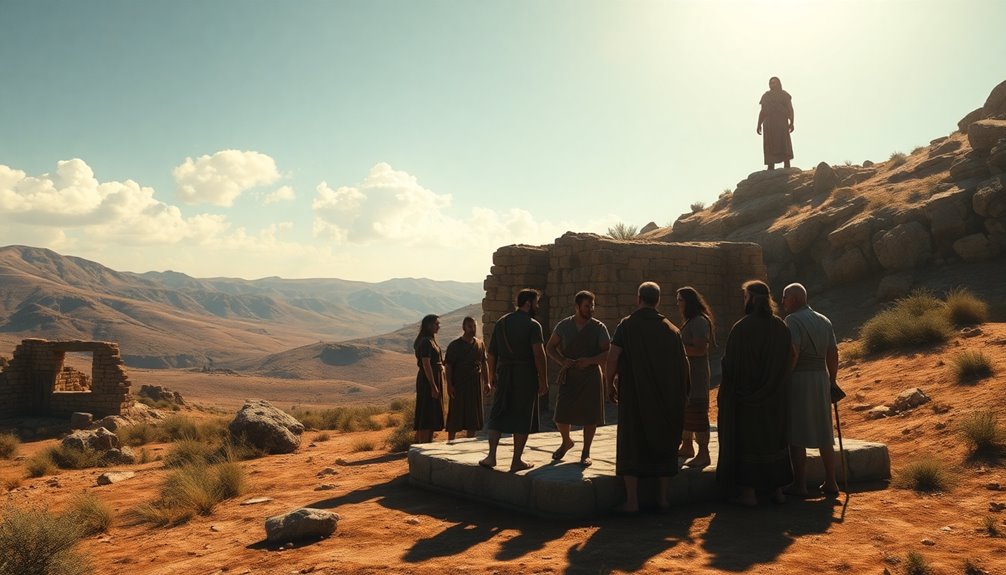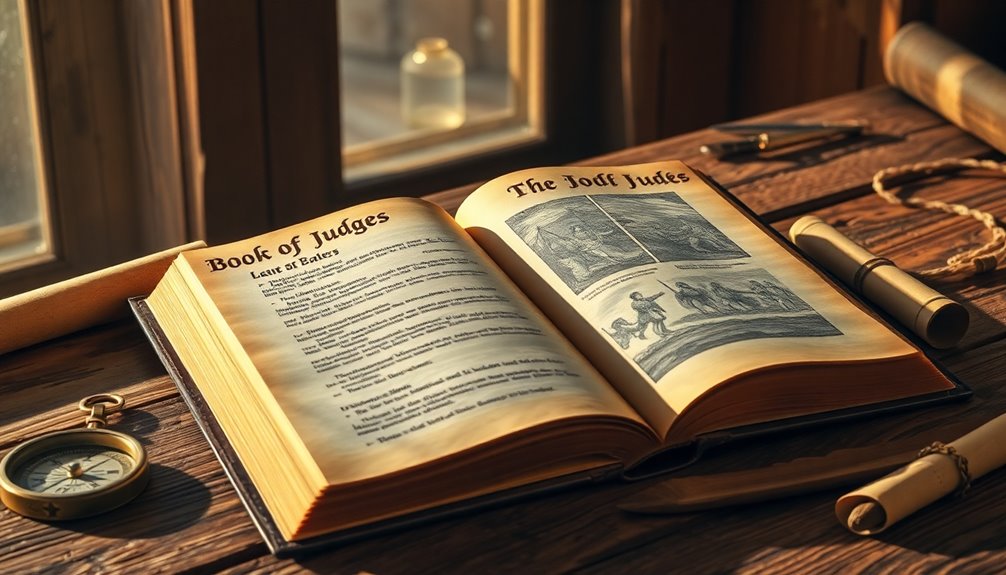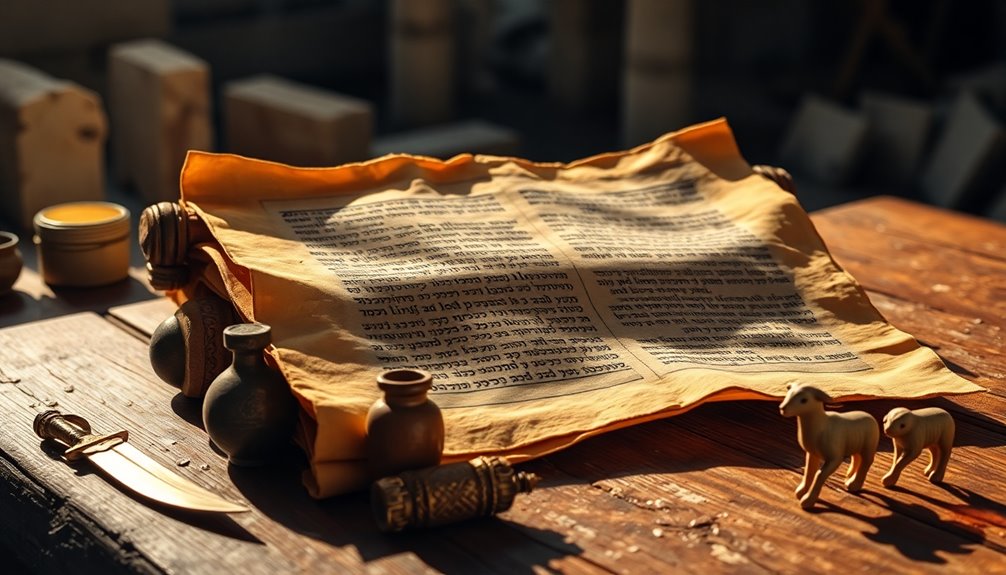The Book of Judges covers a chaotic period in Israel's history, after Joshua's death, lasting around 330 years. It details cycles of sin, oppression, repentance, and deliverance, illustrating how God raises judges to lead the people. Each judge, like Deborah and Gideon, faces unique challenges, yet the cycle often restarts after their death. The narrative reflects Israel's struggles with disunity and moral decline due to fragmented tribal dynamics. This text offers important lessons in accountability and community faith. If you explore further, you'll uncover the rich themes and insights that resonate today.
Key Takeaways
- The Book of Judges covers a 330-year period in Israel's history following Joshua's death, detailing cycles of sin and redemption.
- It features a recurring pattern where Israel sins, faces oppression, repents, and is delivered by judges raised by God.
- Israel's tribal dynamics lead to internal conflicts, highlighting the need for cohesive leadership amid moral decline and chaos.
- Notable judges like Deborah and Gideon demonstrate diverse leadership, reflecting the importance of both genders in guiding the community.
- The narratives emphasize moral lessons over historical accuracy, illustrating the consequences of disobedience and the importance of faith in leadership.
Introduction

In the Book of Judges, you'll discover a pivotal era in Israel's history that unfolds after Joshua's death. This period, spanning approximately 330 years, details the struggles and triumphs of Israel's judges as they lead the people through cycles of disobedience and divine deliverance.
You'll notice that the narrative begins with the nation grappling with the consequences of failing to fully conquer the Promised Land, which sets the stage for the moral decline that follows.
Traditionally attributed to the prophet Samuel, the Book of Judges is structured into two main sections. The first part focuses on the deliverance brought by Israel's judges in chapters 1-16, while the latter section serves as an appendix, showcasing the lawlessness and chaos that ensued in chapters 17-21.
As you read, you'll see key themes emerge, including the dangers of idolatry and the necessity for repentance. Despite the people's rebellion, God's unwavering compassion remains evident throughout, highlighting the importance of returning to Him.
Ultimately, the Book of Judges reveals a time when Israel needed guidance, setting the stage for the eventual establishment of a monarchy.
Key Verses on Israel's Cycle

As you explore the key verses on Israel's cycle in the Book of Judges, you'll notice a clear pattern of sin, oppression, and deliverance.
Judges 2:16-19 provides a vivid outline of this cycle, while Judges 21:25 illustrates the consequences of their moral decline.
These references highlight how God's compassion shines through even amidst Israel's repeated failures.
Primary Bible References
The Book of Judges reveals a troubling cycle of disobedience and redemption that Israel repeatedly experiences. In Judges 2:16-19, you see this cycle clearly illustrated. God raises judges to save Israel from oppression, yet after each judge dies, the people return to their sinful ways. This pattern emphasizes how quickly Israel forgets God's commandments and the consequences that follow.
In Judges 10:15, the Israelites finally recognize their sins and plead for God's help, showcasing their awareness of the gravity of their situation. Despite this acknowledgment, the moral chaos continues, as highlighted in Judges 21:25, where it states, "In those days, Israel had no king; everyone did as they saw fit." This lack of leadership reveals the depths of their disarray.
Throughout the book, the repeated cycles of sin, oppression, repentance, and deliverance serve as a crucial theme. It illustrates that while Israel forsakes God's guidance, His unwavering compassion remains. Each time they repent, God would extend His mercy, reminding you of the importance of turning back to Him in times of trouble.
Secondary Bible References
Exploring key verses from the Book of Judges reveals the depth of Israel's tumultuous journey through cycles of sin and redemption. Judges 2:16-19 effectively illustrates this cycle, showcasing Israel's disobedience followed by oppression, repentance, and divine deliverance. When the Israelites faced the consequences of their actions, they cried out to God, demonstrating their reliance on His mercy.
Judges 10:15 highlights a pivotal moment when Israel acknowledges its sin and pleads for forgiveness, showing that repentance is crucial for restoration. This pattern repeats throughout the book, underscoring the desperate need for divine intervention. The phrase "the people of Israel cried out to the Lord" resonates across multiple chapters, emphasizing that their cries lead to God's response.
In Judges 3:9-11, God raises up Othniel, a judge, to deliver the Israelites from their oppressors, reinforcing the idea that God responds to their pleas.
Finally, Judges 21:25 encapsulates the chaotic spirit of the time, stating, "In those days there was no king in Israel; everyone did what was right in his own eyes," revealing the moral decline that stemmed from a lack of leadership.
Ancient Israelite Tribal Dynamics

Ancient Israelite society was marked by a complex web of tribal dynamics that shaped its history and governance. During the period of the Judges, the tribes of Israel often operated independently, creating a fragmented society without central authority. This disunity led to cycles of conflict and disobedience, as tribes faced threats that necessitated the emergence of regional judges.
Figures like Othniel from Judah and Ehud from Benjamin rose to leadership in response to specific challenges, highlighting how local needs dictated governance. The consequences of this fragmentation became evident through internal conflicts, as seen in the near extinction of the tribes of Manasseh and Benjamin. Judges 21:25 captures the chaotic state of Israel during this time, emphasizing the absence of a king and the urgent need for cohesive leadership.
Notable judges, such as Deborah and Gideon, played significant roles, showing that both men and women contributed to tribal leadership despite the overarching lawlessness. This dynamic environment illustrates the challenges and complexities of the tribes of Israel, which profoundly influenced Israel's history during the tumultuous period of the Judges.
Cyclical Patterns in Israel's History

Throughout the Book of Judges, you can see a clear cyclical pattern that defines Israel's history during this tumultuous period. This cycle begins with sin, as the Israelites repeatedly turn away from God, indulging in idolatry and disobedience. Their actions lead to oppression from surrounding nations, a consequence that leaves them in desperate straits.
As oppression deepens, the Israelites recognize their plight and turn back to God, crying out for help and mercy. In response, God raises up deliverers, known as judges, such as Othniel, Ehud, and Deborah. Each judge responds to the cries of the people, leading them out of oppression and restoring a sense of order.
However, this deliverance is often temporary. Once peace is established, the cycle begins anew, as Israel falls back into sin and the cycle of oppression starts all over again.
Judges 21:25 encapsulates this chaos, stating, "everyone did what was right in their own eyes." This repetitive cycle serves as a stark reminder of the consequences of abandoning God's covenant and highlights the need for divine leadership in Israel.
Judges as Historical Fiction?

When you consider the Book of Judges, you might question its historical accuracy.
While it's rooted in real events, the narrative often leans into hyperbole and moral lessons, shaping it more as historical fiction than a straightforward account.
Understanding this blend can help you appreciate its purpose in conveying Israelite identity and faithfulness to God.
Debunk Misconceptions About Judges
Many people mistakenly view the Book of Judges as mere historical fiction, but it's actually a genuine account of real events and figures from Israel's tumultuous past. Authored traditionally by the prophet Samuel, it reflects the 11th century B.C., shortly after the period of the Judges. This context is crucial, as it highlights the cyclical nature of Israel's struggles with sin, divine judgment, and deliverance.
The book is graphic and often violent, detailing the moral decline in Israel and the chaos resulting from disobedience to God. These narratives aren't fictional embellishments; they serve as stark reminders of the consequences that can arise from forsaking one's faith. The recurring theme of turning away from the true gods, leading to death and destruction, emphasizes the seriousness of Israel's plight.
Judges isn't just a collection of tales; it offers insights into Israel's spiritual journey. By understanding the historical significance behind these events, you can appreciate the profound lessons about faith, obedience, and the dire repercussions of straying from God's path.
This book remains a vital part of Israel's historical narrative, deserving of recognition beyond mere fiction.
Historical Accuracy Questioned
The Book of Judges, while rich in narrative and lessons, faces scrutiny regarding its historical accuracy. Scholars believe that this text, which chronicles about 330 years of Israel's history, may serve more as historical fiction than a straightforward historical account. The cyclical pattern of sin, oppression, repentance, and deliverance depicted in the stories often raises questions about the reliability of the events described.
Exaggerated accounts of figures like Samson and Jephthah further complicate the narrative's credibility. These tales of violence and heroism seem designed to convey moral and theological lessons rather than factual history. Additionally, the lack of archaeological evidence supporting many specific events in Judges leads historians to view it as a reflection of ancient Israel's cultural and social dynamics.
Critics argue that the narrative structure, particularly the recurring cycles of decline and need for divine leadership, hints at a didactic purpose. This suggests that the authors aimed to illustrate a deeper truth about Israel's relationship with God rather than provide an objective historical record.
Thus, the historical accuracy of Judges remains a topic of ongoing debate among scholars and readers alike.
Moral Lessons for Modern Living

Your daily choices can reflect your faith in meaningful ways, shaping not just your life but also the lives of those around you.
Engaging in community faith practices strengthens bonds and reinforces shared values, just as it did for the Israelites.
Daily Choices Reflect Faith
In daily life, choices reflect our faith and values, shaping both our spiritual journey and the community around us. The cyclical pattern of sin, oppression, repentance, and deliverance in the Book of Judges reminds us that our daily choices can either lead to spiritual decline or restoration.
When we forget God's past deliverances, we risk compromising our morals and embracing idolatry. This highlights the importance of daily remembrance and gratitude in our lives.
The repeated failures of the judges emphasize personal accountability. Seeking godly leadership and making wise choices matters, as our decisions impact not just ourselves but also our communities.
The tragic outcomes of stories like Jephthah's vow illustrate the profound consequences of our moral choices.
However, the Book of Judges also teaches us about the power of repentance. Despite Israel's rebellion, God remained faithful, offering forgiveness and restoration.
You can embrace this opportunity today by turning back to God with sincerity. Remember, your daily choices shape your faith and influence those around you, inviting you to live in a way that reflects the love and truth of God. Additionally, maintaining a high vibrational energy during challenges can help align with desired realities and foster a positive mindset in your spiritual journey.
Community Faith Practices
Daily choices not only shape individual faith but also influence the collective spirit of a community. In the Book of Judges, Israel's cyclical pattern of sin, oppression, repentance, and deliverance serves as a potent reminder of the consequences that arise from turning away from God. Your community must embrace faithfulness, recognizing that shared values and spiritual commitments can lead to a stronger, more resilient group.
The stories of the judges illustrate the importance of leadership rooted in faith and righteousness. By seeking leaders who prioritize moral integrity and divine guidance, you can foster an environment where accountability thrives. Without a strong moral framework, communities risk falling into chaos, just as Israel did when there was no king to guide them.
Moreover, the call for repentance in Judges emphasizes humility and the need to return to God. Cultivating an atmosphere of grace and forgiveness encourages everyone to support one another in their faith journeys.
Lessons From Israel's Failures

Throughout the Book of Judges, one can glean valuable lessons from Israel's failures that resonate even today. The repetitive cycle of sin, oppression, repentance, and deliverance reveals how disobedience to God's commands leads to suffering the consequences.
When Israel failed to drive out Canaanite influences, they compromised their faith for convenience, which resulted in cultural assimilation and idolatry. This serves as a stark reminder to you about the dangers of allowing external pressures to shape your beliefs.
The tragic story of Jephthah highlights the severe consequences of rash vows and the necessity of understanding God's character during tough decisions. Similarly, Samson's narrative warns you about the perils of moral failure; even chosen deliverers can stray from their divine purpose.
The chaotic ending of Judges, marked by lawlessness and civil strife, underscores the urgent need for godly leadership. The refrain, "In those days, Israel had no king," reflects a societal crisis that resonates with the need for authority grounded in faith.
These lessons remind you to remain faithful, recognizing that true leadership comes from a commitment to God's guidance in your life.
Additional Resources

Exploring the Book of Judges opens up a wealth of additional resources that can deepen your understanding of its complex themes and narratives. For a more in-depth look, consider reading "Judges and Ruth: God in Chaos" by Barry G. Webb and "Judges, Ruth: An Exegetical and Theological Exposition of Holy Scripture" by Daniel I. Block. These works provide valuable insights into the motivations and actions of Israel's judges and the overarching message of the text.
Additionally, BibleProject offers excellent visual aids, including a Judges Overview Poster in JPG format and a video resource titled "Judges" in MP4 format. These tools help clarify the book's structure and key events, making it easier to grasp the significant themes.
Engaging with the community through BibleProject gives you access to a wealth of educational materials. You can subscribe for updates and learn about career opportunities that support the creation of free resources.
Whether you're looking for scholarly works or multimedia tools, these additional resources enrich your study of Judges and amplify your understanding of its moral implications and historical context.
Frequently Asked Questions
What Are the Main Points in the Book of Judges?
The main points in the Book of Judges revolve around Israel's cycle of disobedience, oppression, and redemption.
You'll see how the Israelites repeatedly turn from God, leading to their suffering under foreign powers.
You'll also notice twelve judges who rise to deliver them, each with unique strengths and flaws.
The narrative highlights the chaos and moral decline in society, emphasizing the need for divine guidance and the eventual desire for a king.
What Is the Book of Judges in a Nutshell?
The Book of Judges is a fascinating account of Israel's history, showcasing a cycle of sin, oppression, repentance, and deliverance.
You'll see various judges like Deborah and Gideon rise to lead the people during turbulent times. Despite their struggles, God's compassion shines through, reminding you of the consequences of disobedience.
Ultimately, it illustrates a chaotic society lacking centralized leadership, leaving everyone to do as they please, which highlights the need for guidance.
What Is the Lesson of the Book of Judges?
The lesson you can take from the Book of Judges is the importance of recognizing the consequences of moral choices.
It shows how doing what's right in your own eyes can lead to chaos and suffering.
You'll see that genuine repentance is vital for restoration, and even flawed leaders can be used for good.
Ultimately, it emphasizes the need for divine guidance and the dangers of straying from values and principles.
What Are the Major Events in the Book of Judges?
You'll find several major events in the Book of Judges that illustrate Israel's struggles and triumphs.
First, Ehud assassinates Eglon, sparking victory over Moab.
Then, Deborah inspires Barak to defeat Sisera, showcasing divine guidance.
Gideon's unconventional battle with just 300 men against Midian demonstrates God's power.
Jephthah's tragic vow leads to personal consequences, while Samson's exploits against the Philistines ultimately end in his sacrifice, symbolizing Israel's ongoing fight for freedom.










